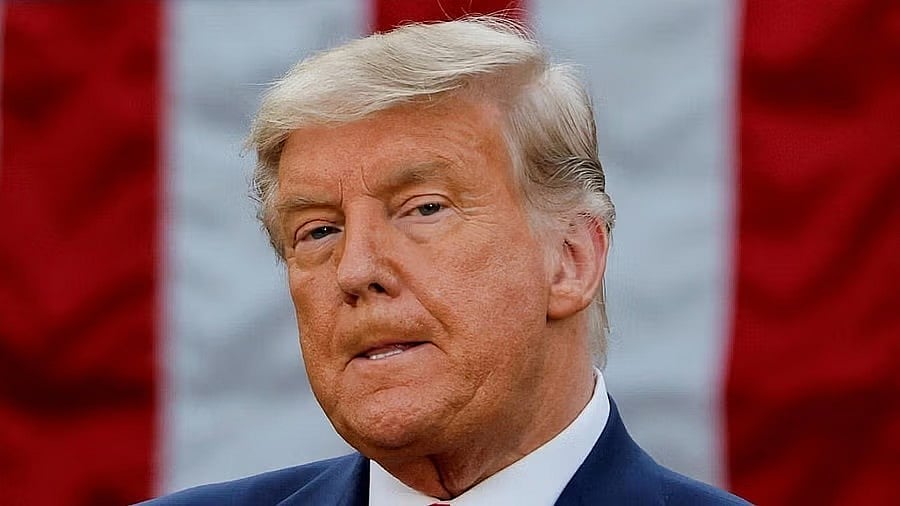
Donald Trump.
Credit: Reuters File Photo
On February 15, 2025, United States President Donald Trump posted a cryptic quote on his platform, Truth Social, attributed to Napoleon Bonaparte: “He who saves the country does not violate the law.” Trump appears to have dramatically reimagined the scope of his executive powers.
The same post was also shared on the official White House account on X.
This quote first appeared in a book published in 1838 authored by Honoré’ de Balzac, written seventeen years after Napoleon’s death. This Napoleonic quote posted by Trump has ignited a firestorm on social media and is the focus of this article. Predictably, the Democrats were quick to capitalise on the controversy.
The battle lines seem to have been drawn because Trump appears to be positioning himself above the law and arguing that his actions fall outside the discussions of constitutionality. Almost 20 lawsuits have already been filed against the Trump administration over federal worker dismissals.
Perhaps Napoleon meant —and Trump implied — that critical actions and decisions taken in the national interest can justify legal and ethical transgressions. But does this suggest that no judge should have the constitutional/legal authority to restrain the president? Trump’s cryptic remark has opened up a Pandora’s box in US intellectual and legal circles. By implication, it suggests that in the pursuit of ‘Making America Great Again’, laws, though necessary, are not always obligatory. This sets the stage for a potential head-on collision between the president (executive branch) and the judiciary, possibly leading to a constitutional crisis. In the process, it could also lead to the usurpation of the powers of the US Congress.
The timing of Trump’s post is unlikely to be coincidental. Incidentally, on the same day Trump posted this, a federal judge for the District of Rhode Island, John J McConnell Jr ruled that the federal government had not fully complied with his order to unfreeze federal spending. Some courts had previously blocked spending tied to Trump’s executive orders. Many Republicans, however, view these rulings as judicial overreach, arguing that Trump is simply trying to curb wasteful government expenditure. The stage now appears set for a showdown at the Supreme Court.
While Trump insists that he will abide by the decisions of the Supreme Court, some of his colleagues have taken to social media to attack the judges and even call for their impeachment. Vice President J D Vance has gone so far as to claim that “judges are not allowed to control the executive’s legitimate power”. This is a dangerous maxim. In other words, whatever the president does cannot be illegal, as long as they do it for the common good. Trump’s post is arguably one of the most controversial ever made by a sitting president. It is profoundly disturbing. The fact is that the president’s office is a creature of the law and subject to checks and balances.
Some legal scholars argue that this cryptic remark could imply laying the groundwork for something far more serious, like refusing to comply with federal court decisions and violating the rule of law. This should not be an alibi for violating court orders or for making America great again. Many law experts, like Kate Shaw, a law professor at the University of Pennsylvania, described the post as demonstrating “maximum contempt for core constitutional values” like separation of powers, freedom of speech and rule of law. Pamela Karlan, law professor at Stanford, argues that “while presidents might act unconstitutionally in particular acts, I never had the sense that there was a president for whom the constitution was essentially meaningless”.
Trump’s post is like a trial balloon and a provocation, and he has been toying with the idea of being above the law. Trump is caught between the need to abide by legal orders on the one hand and his notion of the sanctity of the vote on the other. Hence, to Trump, any action taken to save the country is inherently lawful. However, it’s difficult to do that by ignoring ethical and legal implications.
Disregard of the court rulings can lead to a constitutional crisis, as even some Republican lawmakers have indicated. To what extent Trump’s post will lead to a constitutional crisis remains to be seen. The dilemma is whether one should take Trump’s comment literally or seriously or both.
The question is whether all leaders who claim to save their country can be above the law. Trump seems to believe that it is not necessarily illegal if he can save the country. Make sure Trump’s post is not just a passing thought. This could result in precedents that are unwarranted. In a democracy, laws are not necessarily arbitrary constraints. Rather, they inherently constitute the foundation of governance and justice.
(The writer is a professor in the Department of International Studies, Political Science and History, Christ Deemed to be University)